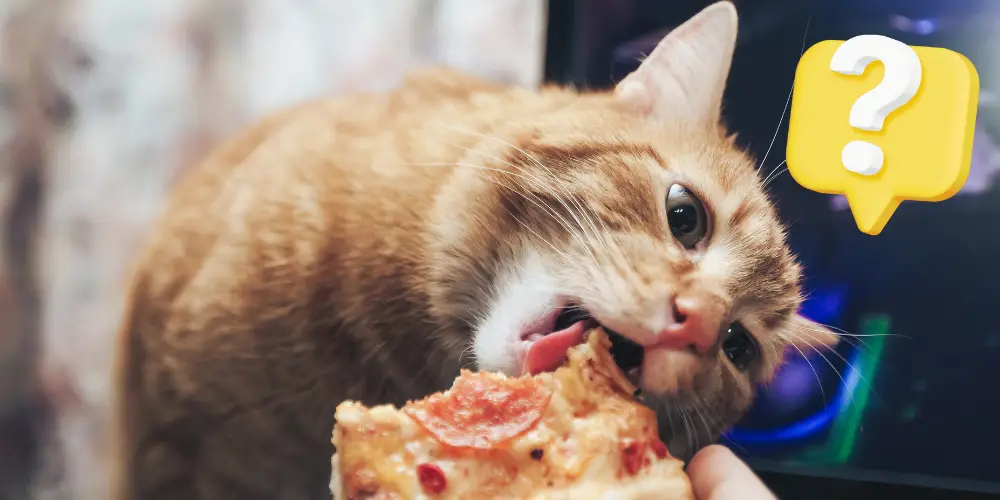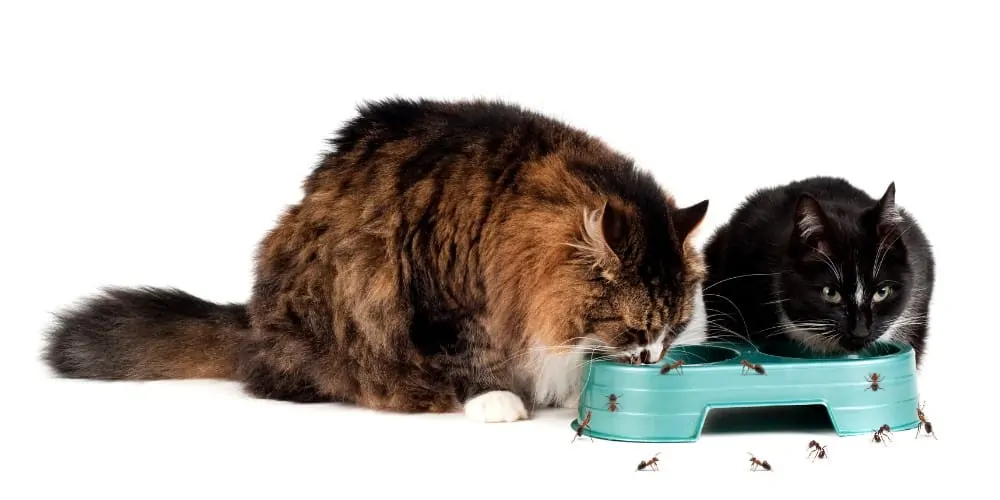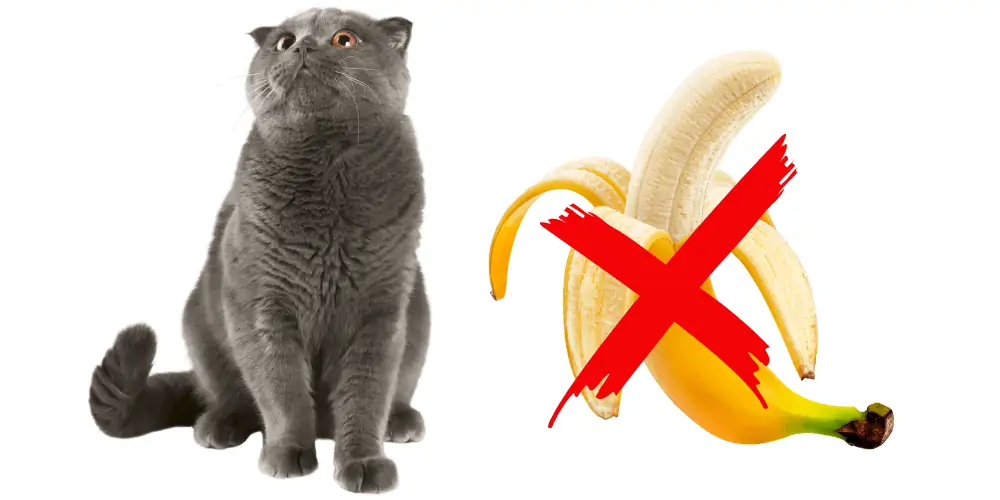Picture this: You’re enjoying a cheesy pizza slice, and your feline friend gives you “that” look. The big question is, Can Cats Eat Pizza?
Cats should not eat pizza. Pizza typically contains ingredients like onions, garlic, and high levels of salt that are toxic to cats. Additionally, dairy products like cheese can be difficult for many cats to digest. Feeding pizza can lead to health issues like gastrointestinal upset in cats.
Dive into this guide to discover the surprising reasons behind this answer and how to keep your kitty happy without sharing that slice!
Key Takeaways
- Cats should not eat pizza due to toxic ingredients like onions, garlic, and high salt levels.
- Many cats are lactose intolerant, making cheese, a common pizza ingredient, potentially harmful.
- Pizza can lead to various health issues in cats, such as gastrointestinal upset, allergic reactions, obesity, heart disease, and pancreatitis.
- Monitoring symptoms and contacting a veterinarian is crucial if a cat ingests pizza.
- Instead of pizza, safe human food alternatives like shredded chicken, boiled fish, or scrambled eggs can be given to cats.
- Commercial cat treats are a safe alternative as they contain the necessary nutrients for feline health.
- It is essential to store pizza out of the reach of cats and educate household members about the risks of feeding pizza to them.
- Consistency in training and providing gentle deterrents are key to teaching cats to avoid pizza.
- Even seemingly harmless pizza ingredients might contain hidden dangers for cats, so avoiding pizza is best.
- Ensuring that the shared treats with cats are safe is crucial to prioritize their health and well-being above the fleeting joy of sharing.
Understanding Cat Diets
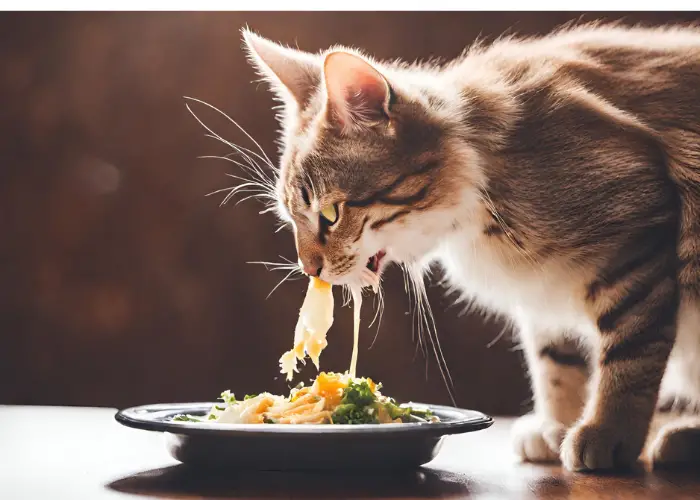
- Omnivores or Carnivores: What Are Cats? Cats are obligate carnivores. This means they predominantly require a meat-based diet, drawing specific nutrients from it that they can’t get from other food sources.
- Essential Nutrients for Cats: Cats require specific nutrients that pizzas can’t provide, including taurine, a type of amino acid crucial for their health.
The Ingredients in Pizza
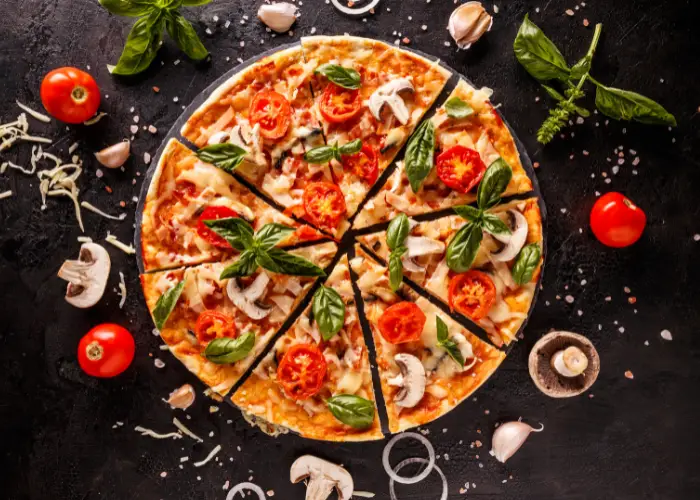
- Dough: Raw dough can be harmful. Yeast, when ingested, can rise in a cat’s stomach, possibly leading to dangerous bloating or even alcohol poisoning.
- Tomato Sauce: While tomatoes are safe, many sauces contain onion and garlic, which are toxic for cats.
- Cheese: Most cats are lactose intolerant. Cheese, which is dairy, can lead to digestive issues.
Possible Effects of Pizza on Cats
- Digestive Issues: Pizza can lead to vomiting, diarrhea, and stomach pain soon after eating.
- Handling Digestive Issues: Withhold food for 12-24 hours and call your vet if symptoms persist.
- Allergic Reactions: Some cats might be allergic to ingredients in pizza, leading to itchy skin, ear inflammation, and respiratory distress.
- Long-term Risks: Regular consumption of pizza can contribute to obesity, heart disease, and pancreatitis due to its high carb, fat, and salt content.
Signs Your Cat Has Eaten Pizza
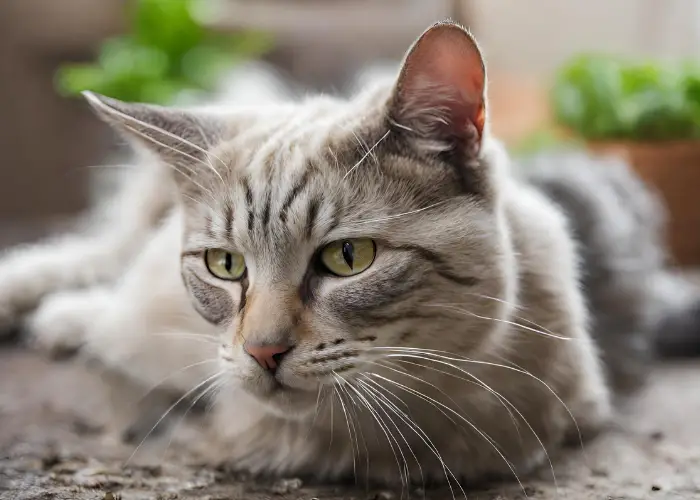
- Immediate Symptoms: Look out for vomiting, diarrhea, loss of appetite, excessive thirst, or lethargy shortly after eating.
- Behavioral Signs: Monitor for unusual actions like hiding, seeking comfort, acting antsy, lip-smacking, or repeatedly swallowing.
- Monitoring: If you notice these symptoms, withhold food for a few hours and call your vet if they persist.
Tips for Keeping Pizza Away from Your Feline Friend
- Storing Pizza Safely: Ensure leftover pizza or a fresh hot delivery is kept out of your cat’s reach.
- Educate Household Members: Ensure that everyone, from the kids to grandma, knows about the potential risks of feeding pizza to your cat.
- Distract Your Cat: When eating, provide your cat with toys or a treat to keep them occupied.
What to Do If Your Cat Ingests Pizza
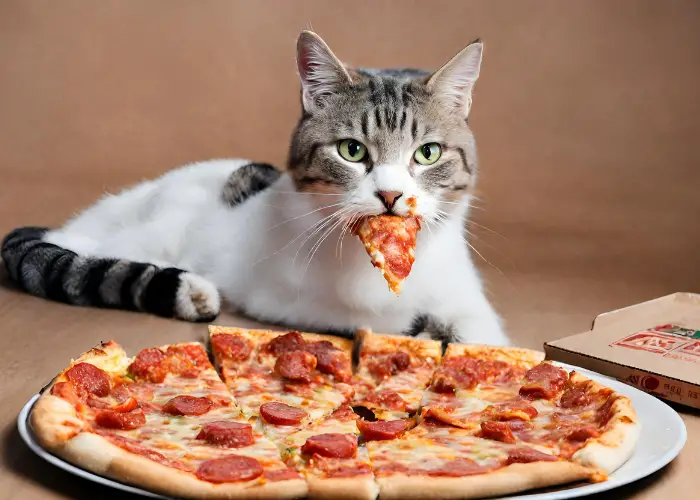
- Stay Calm: Your reaction will influence your pet’s stress levels.
- Monitor Symptoms: From changes in behavior to physical symptoms like vomiting, keep a close eye on your cat.
- Contact Your Vet: Consult a veterinarian if you’re worried or symptoms persist.
Alternatives to Pizza for Feline Cravings
Sharing is caring, but we must ensure that our shared treats are safe with our pets. If you’re keen on treating your cat, consider:
- Safe Human Foods: These include options like shredded chicken, boiled fish, or even tiny bits of scrambled egg.
- Commercial Cat Treats: Numerous treats on the market are delicious for your cat and contain the necessary nutrients.
- DIY Cat-Safe Treats: Why not craft a cat-safe pizza? Using cat food as a base and adding some cat-safe toppings can be fun!
Frequently Asked Questions (FAQs)
Got more questions? Here’s a quick rundown:
- Can cats eat any pizza? It’s best to avoid any pizza. Even “harmless” ingredients might contain hidden dangers.
- Safe pizza toppings for cats? Ideally, none. But if you must, stick to plain meat toppings without any added seasonings.
- How do I train my cat to avoid pizza? Consistency is key. Use gentle deterrents and provide alternatives.
Conclusion
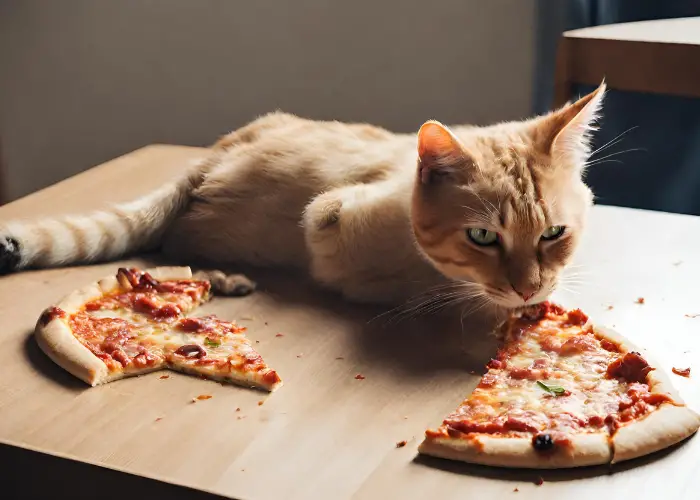
Your cat might be your best buddy.
While sharing is a testament to love, it’s best to err on caution when it comes to food, especially human food like pizza.
Prioritize their health and well-being above that fleeting moment of joy.
Do you have any personal cat and pizza stories or queries?
Feel free to share or ask in the comments section!
References:
- Hall, J. A., & MacLeay, J. M. (2017). Cats and Carbohydrates: The Carnivore Fantasy? National Center for Biotechnology Information. https://www.ncbi.nlm.nih.gov/pmc/articles/PMC5753635/
- Hewson-Hughes, A. K., Hewson-Hughes, V. L., Colyer, A., Miller, A. T., McGrane, S. J., Hall, S. R., Butterwick, R. F., Simpson, S. J., & Raubenheimer, D. (2019). Food Preferences in Cats: Effect of Dietary Composition and Intrinsic Variables on Diet Selection. National Center for Biotechnology Information. https://www.ncbi.nlm.nih.gov/pmc/articles/PMC6616589/
- National Research Council. (2006). Nutrient Requirements of Dogs and Cats. The National Academies Press. https://www.nap.edu/catalog/10668/nutrient-requirements-of-dogs-and-cats
